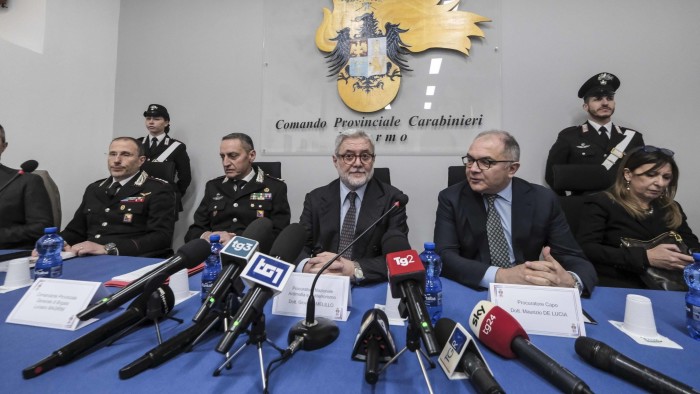Unlock the Editor’s Digest for free
Italian police have arrested 160 members of Sicily’s Cosa Nostra, after wiretaps revealed moves by mafia families to recruit a new generation of footsoldiers and recreate their once-powerful ruling council.
The crackdown came after wiretaps of recently freed Cosa Nostra bosses also intercepted their complaints that Prime Minister Giorgia Meloni’s government was not allowing them to communicate with some of their still-incarcerated colleagues.
“Organised crime is in trouble — the fight against the mafia has not stopped and will not stop,” Meloni wrote in a post on X, hailing the overnight arrests as “a very hard blow to Cosa Nostra”.
Meloni had earlier written that the intercepted complaints against her government “for not easing the harsh prison [conditions] for the mobsters” was evidence that Italy was “on the right track” in its fight against organised crime.
However, John Dickie, professor at University College London and author of several books on the mafia, said the investigation had revealed Cosa Nostra’s impressive ability to regenerate and the enduring appeal that organised crime still held for some younger Sicilians.
“These old guys do not stop,” Dickie said. “People are generally surprised at this extraordinary organisational resilience. Prison is clearly not working to reform these people. They come out . . . and get straight working again.
“They are a living memory of the old days of great mafia power and people sort of flock to them,” he added, calling it “incredible” that ageing mafiosis wanted to restart Cosa Nostra’s old ruling council — the cupola — to co-ordinate their activities and enforce mafia rules. “It really is in their DNA.”
Though mobsters terrorised Sicily for decades, harsh crackdowns in the 1990s and early 2000s seriously weakened the Cosa Nostra, with many of its top bosses dead or imprisoned and its once-tight grip over Sicilian society relaxed.
After decades on the run the group’s most wanted fugitive “Godfather”, Matteo Messina Denaro, who sat on the cupola and was convicted in absentia of orchestrating the 1992 car bombings that killed Italy’s two most famous anti-mafia prosecutors, was arrested in 2023 at a medical clinic in Palermo. He died in prison months later.
The Calabria-based ‘Ndrangheta, which has developed powerful global networks, has become Europe’s most powerful organised crime group.
But with several Cosa Nostra bosses recently released after completing long prison sentences, prosecutors said the Sicilian mafia had been stepping up the pace of its criminal activities.
“The mafia is absolutely active — and is trying to recreate the army of the past,” Maurizio De Lucia, Palermo’s chief prosecutor, said at a press conference on Tuesday. “There are many young people who are influenced by the old bosses who return.”
Giovanni Melillo, head of Italy’s anti-mafia directorate, said Cosa Nostra is forging ever closer links with the ‘Ndrangheta as it sought to regain its influence in the global drugs trade, including in North America.
“Cosa Nostra is trying to revive its fortunes by trying to enter much broader systems of relationships,” he said. “The relations with ‘Ndrangheta are increasingly close.”

Franco Bonura, an 82-year-old mafia boss who spent years behind bars, was taken back into custody last month, for allegedly working to rejuvenate old mafia relationships and start new business deals.
“One thing is clear: the subjects who have been in prison, once they come out, they go back to doing what they have always done,” De Lucia said.
The police operation on Monday night involved more than 1,200 officers across Palermo and its suburbs, and was the culmination of nearly two years of investigations, including extensive wiretapping.
In total, 163 people were arrested or rearrested on suspicion of a litany of criminal charges including mafia-type association, attempted murder, extortion, drug trafficking and running illegal gambling networks, including online.
De Lucia said mafia communications, which once consisted of passing handwritten encrypted notes, were now far more technologically sophisticated, often relying on high-tech encrypted phones — both in and outside prison
And while some imprisoned bosses were not allowed any contact with the outside world, prosecutors said many incarcerated mafiosi still communicated with the aid of tiny smuggled phones and thousands of different SIM cards.
“The difference between being inside and outside prison is tenuous,” said De Lucia, who noted that even “high security prisons are far from impervious to communications from the outside world. The availability of cellular devices poses a serious problem.”

